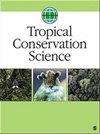多维社会资本与农民环境治理参与意愿
IF 1.6
4区 环境科学与生态学
Q2 BIODIVERSITY CONSERVATION
引用次数: 3
摘要
几十年来,中国农村的正规制度建设与发展相对滞后,社会资本的作用显得尤为重要。在中国实施乡村振兴战略的背景下,考虑社会资本对农民参与环境治理意愿的影响,有利于改善农村人居环境,提高相关政策的执行效率。方法基于安徽省农村微观数据,运用logit模型探讨信任、网络、规范等社会资本对农民环境治理参与意愿的影响。结果网络社会资本和规范社会资本对农民参与环境治理意愿均有显著影响,且网络社会资本的边际效应大于规范社会资本。在同时控制社会网络和社会规范之后,社会信任的影响并不明显。随着农民受教育程度和收入水平的提高,社会网络和社会规范对农民参与意愿的影响逐渐减弱,社会资本呈现出“穷人的资本”的特征。综上所述,通过培养村庄信任、拓宽社会网络、营造互利共赢的社会习俗,可以提高农民参与村庄环境治理的意愿,为改善农村人居环境奠定坚实的基础。有效的环境治理是实现可持续发展目标的重要措施。农民参与环境治理的意愿对提高农村环境治理的有效性具有重要作用。因此,研究社会资本如何影响农民参与意愿,不仅为农村环境治理和保护提供了宝贵的启示,也为可持续发展和生物多样性保护提供了一条漫长的道路。本文章由计算机程序翻译,如有差异,请以英文原文为准。
Multi-Dimensional Social Capital and Farmer’s Willingness to Participate in Environmental Governance
Background The construction and development of formal institutions has been lagging behind in rural areas of China for decades, so the role of social capital is particularly important. In the context of China’s implementation of the rural revitalization strategy, considering the impact of social capital on farmers’ willingness to participate in environmental governance is profitable to the improvement of rural human settlement environment and the increase in the implementation efficiency of relevant policies. Methods Based on the micro-data of villages in Anhui Province, this paper uses the logit model to explore the effects of social capital of trust, network, and norm on farmers’ willingness to participate in environmental governance. Results The results show that both network social capital and norm social capital have a significant effect on farmers’ willingness to participate in environmental governance, and the marginal effect of network social capital is greater than that of norm social capital. After controlling both social network and social norm, however, the effect of social trust is not evident. With the improvement in farmers’ schooling level and income level, the impact of social network and social norms on farmers’ willingness to participate become gradually insignificant, and social capital appears to be “the capital of the poor.” Conclusion Given the above results, we can improve the willingness of farmers to participate in the village environmental governance and lay a solid foundation for the improvement of rural human settlement environment by cultivating village trust, broadening social network, and creating a social custom of mutual benefit. Implications for Conservation Effective environmental governance is an important measure to achieve sustainable development goals. Farmers’ willingness to participate in environmental governance plays a significant role in improving the effectiveness of rural environmental governance. Accordingly, the study of how social capital affects farmers’ willingness to participate provides not only valuable enlightenment for rural environmental governance and protection, but also a long path for sustainable development and biodiversity protection.
求助全文
通过发布文献求助,成功后即可免费获取论文全文。
去求助
来源期刊

Tropical Conservation Science
BIODIVERSITY CONSERVATION-
CiteScore
3.60
自引率
5.90%
发文量
16
审稿时长
>12 weeks
期刊介绍:
Tropical Conservation Science is a peer-reviewed, open access journal that publishes original research papers and state-of-the-art reviews of broad interest to the field of conservation of tropical forests and of other tropical ecosystems.
 求助内容:
求助内容: 应助结果提醒方式:
应助结果提醒方式:


